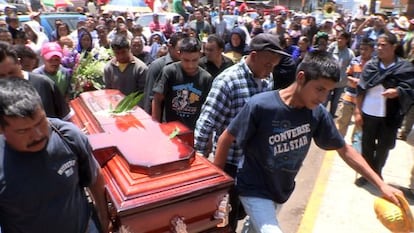Mexico finally approves law to help victims of ongoing brutal drug war
Legislation will also cover members of cartels and other criminal gangs


Mexico's human rights legislation was strengthened on Monday after Congress passed a law that, for the first time, recognizes and protects the rights of crime victims in a country where close to 50,000 people have died in more than five years of drug-related violence, and where thousands more have disappeared.
The law covers dead, wounded, kidnapped and missing persons, whether they be civilians or members of drug cartels or other crime gangs. It will also cover victims of crimes such as extortion. The law was five years in the making.
"There should be no need for a law like this, because it is born from a huge collective tragedy; it has also arrived late. But that said, we should emphasize that fortunately, it now exists," Emilio Álvarez Icaza, spokesman for the Justice and Dignity Movement, told EL PAÍS.
The measure has now been approved by both chambers of Congress and must be signed into law by President Felipe Calderón, who has supported the initiative. It will require the three levels of government - local, state and federal - to provide legal, medical and financial assistance to victims of crime and to those whose human rights have been violated.
The law also requires authorities to make efforts to identify crime victims' remains or locate those who might still be alive. Relatives of people who have gone missing due to drug violence often claim that the authorities are slow or reluctant to help find missing people.
The law will establish a national registry of victims and set aside funds to compensate them, financed in part by assets seized from organized crime groups. The compensation payments could reach as much as 50,000 euros.
A panel will be set up that will include representatives of victims' groups and of the United Nations High Commissioner for Human Rights.
Hundreds of bodies have been found buried in mass graves, and thousands more have been hacked to pieces, dissolved or dumped in vacant lots. Those victims, often thought to be drug gang members killed by rivals, frequently go unidentified.
Passage of the bill came after a year of protests and meetings with President Calderón to draw attention to the plight of victims of crime and human rights violations in Mexico. The law is one of the major demands of the Justice and Dignity Movement, led by poet Javier Sicilia.
He became deeply involved with the peace movement after his son was killed, along with six of his friends, by a drug gang in 2011. Sicilia has organized dozens of public marches and demonstrations calling for an end to the drug violence.
There are high hopes for the law, with Senators Fernando Baeza and Tomás Torres saying that it "lays the foundations to reconstruct the social fabric that has been so gravely affected by violence."
While the drug violence in Mexico has not ended - there are even signs that the killings have peaked - it may be impossible to begin the healing process while the violence continues, lawmakers say.
Tu suscripción se está usando en otro dispositivo
¿Quieres añadir otro usuario a tu suscripción?
Si continúas leyendo en este dispositivo, no se podrá leer en el otro.
FlechaTu suscripción se está usando en otro dispositivo y solo puedes acceder a EL PAÍS desde un dispositivo a la vez.
Si quieres compartir tu cuenta, cambia tu suscripción a la modalidad Premium, así podrás añadir otro usuario. Cada uno accederá con su propia cuenta de email, lo que os permitirá personalizar vuestra experiencia en EL PAÍS.
¿Tienes una suscripción de empresa? Accede aquí para contratar más cuentas.
En el caso de no saber quién está usando tu cuenta, te recomendamos cambiar tu contraseña aquí.
Si decides continuar compartiendo tu cuenta, este mensaje se mostrará en tu dispositivo y en el de la otra persona que está usando tu cuenta de forma indefinida, afectando a tu experiencia de lectura. Puedes consultar aquí los términos y condiciones de la suscripción digital.








































